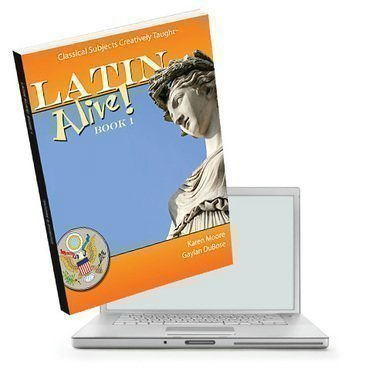Latin 1
Placement Information
Placement Process
One critical factor for restful learning is the proper placement of students. If you are unsure which level is the best fit for your student, reach out to the instructor you are considering. Once registered, anticipate contact regarding placement evaluations from instructors by May 15th and throughout the summer. Students must be registered to enter the placement process. Early placement exams may allow time for tutoring or additional review based on the outcomes. See more about placement evaluations in our Student-Parent Handbook.
Latin Placement Process
For registered students, please anticipate contact regarding placement evaluations from instructors by May 15th and throughout the summer. Students must be registered in a Latin course to receive a placement assessment. Latin classes have a detailed and specific placement process.
Learn more about the Latin placement process here.

Required Materials:
Books and supplies are not included in the purchase of the course.
- Latin Alive! Book 1 Version 3.0 (Student Edition)
- A notebook for taking notes
- Physical flashcards are optional, but may be helpful.
Older versions of the student edition are_ not _compatible with the course.
The instructors will be adapting and augmenting the curriculum as they see best for the learning objectives of the course. Additional materials provided by the instructors may include worksheets, games, and spoken Latin activities. As such, students should be prepared to regularly print PDF files supplied by their teacher well in advance of the class in which they will be used.
_Some vocabulary has been modified and the textbook readings adapted. Students should know that we will not be completing every exercise and reading available in the book in class. _
Amanda Reeves has a BA in Greek and Latin from Stanford University, where she received recognition in her department for both her enthusiasm for the classical world as well as her excellence in scholarship. In her 10+ years as an educator, she has fiercely held to the belief that every student can fall in love with Latin and has celebrated each of the many times it has happened in her classroom. As Dean of the Lower School at Scholé, she supports teachers as they develop classrooms and curricula to help Scholé’s youngest students cultivate a love of learning in their pursuit of restful classical education. Having learned Latin online as a homeschooled student, Amanda is passionate about distance learning and enjoys integrating traditional grammar and translation methods with spoken Latin to produce the best educational experience for her students. When she is not traveling the world, she can be found in New Haven, Connecticut, waxing poetic about the Parthenon Marbles and Stanford football, always with a strong cup of coffee in hand.

Edward Kotynski, Chair of Latin Department, grew up as a missionary kid in Indonesia, where his parents were Bible translators. He attributes his love of languages partly to his parents’ work and his childhood experience. He received his BA in ancient languages from Wheaton College in Illinois in 2004, and his MA in classical languages from Vanderbilt University in Tennessee in 2007. Mr. Kotynski has been teaching Latin and Greek for the last fifteen years, mostly at classical Christian schools. He loves sharing his passion for the ancient languages with his students, weaving in historical context and modern connections. He has edited two volumes of Latin Alive! for Classical Academic Press and has also been working on their Greek for Children series with Erin Valdez. He is very excited to be continuing with Scholé Academy this year. Besides Latin and Greek, Mr. Kotynski drinks coffee, loves reading, helps homeschool his kids, and plays board games. He lives with his wife, six children, and two cats, enjoying the craziness of life together.

Parker Moore has been teaching in an online, classical Christian school setting since 2021, and loves the role of teaching younger minds in a classical, online format. Parker is himself a homeschool graduate, coming from a family of nine, homeschooled students.
After graduating in 2013, Parker went on to pursue a Bachelor’s in Political Science and a Master’s in Biblical Exposition, both from Liberty University. He began a PhD in Public Policy, with a focus on political theory and philosophy, in 2021, which is to be completed at the end of 2024.
In addition to his studies, Parker also enjoys books, strong coffee, strength training, and music, having toured the U.S. and Canada with his family band in previous years. Sharing his love of both Latin and the humanities is something which he counts as a great blessing from God, and which he looks forward to at the start of every class.

Tyrone Benson loves language and studied classical languages throughout his undergraduate and graduate careers. He holds a B.A. in Bible and Educational Ministry (double major), an M.A. in Christian Education, and an M.A. in Theology. While in Bible college, before graduating summa cum laude as the valedictorian of his class, he relished four semesters of Biblical Greek, received the distinguished Greek award, and served as lead campus tutor of Biblical Greek. Afterwards, while engaging the classical theological disciplines as a graduate level seminary student, he studied both further Biblical Greek and Biblical Hebrew, from which studies he naturally transitioned into the study and teaching of classical Latin.
Although a lifelong student of various disciplines (even as a magister “teacher,” he ever remains a discipulus “student”), Mgr. Benson is currently focusing on the Latin language, particularly its spinal role within a classical liberal arts curriculum, linking language(s) to history, literature, and theology. For six years, he has been using the Latin texts of Classical Academic Press in teaching Latin out of his love for learning. Having been drawn to Scholé Academy by this very love, he seeks to instill a similar love in all his students.
Quarter 1
- Building blocks: alphabet, pronunciation & names
- 1st conjugation verbs, Present tense
- Nouns: 1st & 2nd declensions
- Cases: Nominative, Accusative & Dative
- Unit 1 Reading & Review
- Adjectives: 1st & 2nd declension
- Irregular verb: esse
Quarter 2
- Verbs: 2nd conjugation, Present system
- Perfect tense
- Ablative case
- Nouns: 3rd declension
- Genitive case
- Verbs: 3rd conjugation
- Units 2-3 Reading and Review
Quarter 3
- Imperatives
- Vocative case
- Unit 4 Reading & Review
- Irregular verbs: ire, ferre, posse
- Pronouns: personal, intensive & demonstrative
- -īus adjectives
- Unit 5 Reading & Review
- Cardinal & ordinal numbers
Quarter 4
- Reflexive pronouns & adjectives
- More pronouns: relative & interrogative
- Adverbs
- 4th conjugation verbs
- The Perfect system: Pluperfect and Future Perfect tenses
- Nouns: 4th & 5th declensions
- Units 6-7: Reading & Review
![]() Computer: You will
need a stable, reliable computer, running with a processor with a speed of 1 GHz or better
on one of the following operating systems: Mac OS X with Mac OS 10.7 or later; Windows 8,
7, Vista (with SP1 or later), or XP (with SP3 or later). We do not recommend using an
iPad or other tablet for joining classes. An inexpensive laptop or netbook would be much
better solutions, as they enable you to plug an Ethernet cable directly into your computer.
Please note that Chromebooks are allowed but not preferred, as they do not support certain
features of the Zoom video conference software such as breakout sessions and annotation,
which may be used by our teachers for class activities.
Computer: You will
need a stable, reliable computer, running with a processor with a speed of 1 GHz or better
on one of the following operating systems: Mac OS X with Mac OS 10.7 or later; Windows 8,
7, Vista (with SP1 or later), or XP (with SP3 or later). We do not recommend using an
iPad or other tablet for joining classes. An inexpensive laptop or netbook would be much
better solutions, as they enable you to plug an Ethernet cable directly into your computer.
Please note that Chromebooks are allowed but not preferred, as they do not support certain
features of the Zoom video conference software such as breakout sessions and annotation,
which may be used by our teachers for class activities.
![]() High-Speed Internet Connection:
You will also need access to high-speed Internet, preferably accessible via Ethernet
cable right into your computer. Using Wi-Fi may work, but will not guarantee you the optimal
use of your bandwidth. The faster your Internet, the better. We recommend using a connection
with a download/upload speed of 5/1 Mbps or better. You can test your Internet connection here.
High-Speed Internet Connection:
You will also need access to high-speed Internet, preferably accessible via Ethernet
cable right into your computer. Using Wi-Fi may work, but will not guarantee you the optimal
use of your bandwidth. The faster your Internet, the better. We recommend using a connection
with a download/upload speed of 5/1 Mbps or better. You can test your Internet connection here.
![]() Webcam: You may
use an external webcam or one that is built in to the computer. Webcam Recommendations:
Good (PC only) | Best (Mac and PC)
Webcam: You may
use an external webcam or one that is built in to the computer. Webcam Recommendations:
Good (PC only) | Best (Mac and PC)
![]() Headset: We recommend
using a headset rather than a built-in microphone and speakers. Using a headset reduces the
level of background noise heard by the entire class. Headset Recommendations: USB | 3.5mm
Headset: We recommend
using a headset rather than a built-in microphone and speakers. Using a headset reduces the
level of background noise heard by the entire class. Headset Recommendations: USB | 3.5mm
![]() Zoom: We use a web
conferencing software called Zoom for our classes, which enables students and teachers to
gather from around the globe face to face in real time. Zoom is free to download and easy
to use.
Zoom: We use a web
conferencing software called Zoom for our classes, which enables students and teachers to
gather from around the globe face to face in real time. Zoom is free to download and easy
to use.  To
download Zoom:
To
download Zoom:
- Visit zoom.us/download.
- Click to download the first option listed, Zoom Client for Meetings.
- Open and run the installer on your computer.
- In August, students will be provided with instructions and a link for joining their particular class.
![]() Scanner: In this
class, students frequently submit homework assignments by scanning pages from their workbooks.
Students and/or their parents should have easy access to a scanner and the ability to use it.
Scanner: In this
class, students frequently submit homework assignments by scanning pages from their workbooks.
Students and/or their parents should have easy access to a scanner and the ability to use it.
Step 1
Step 2
Step 3
Step 4
Explore our courses!
First, read the available course descriptions, noting prerequisites, target grades, and course objectives. If you think your student is prepared for the course, go ahead and register. After registration, a placement assessment may be provided to students, depending on the course and the student’s previous enrollment with Scholé Academy. Registration is finalized when the student’s placement assessment has been returned by the course instructor with placement confirmation.
All Courses | By Subject | By Grade
Read the Student-Parent Handbook.
Please take careful note of our teaching philosophy, our technology requirements, our school policies, the parent agreement, and the distinctions between our grade levels.
Double-check the course section dates and times.
Make sure they don't conflict with other activities in your schedule or other courses you are purchasing. Our system will not catch double-bookings!
You're ready to add course selections to your cart!
Our Assistant to the Principal will be in touch with you after your enrollment to help you with next steps, including any placement evaluations that may be required for your course selections.
This registration will be finalized when the student's placement assessment has been returned by the course instructor with placement confirmation.
